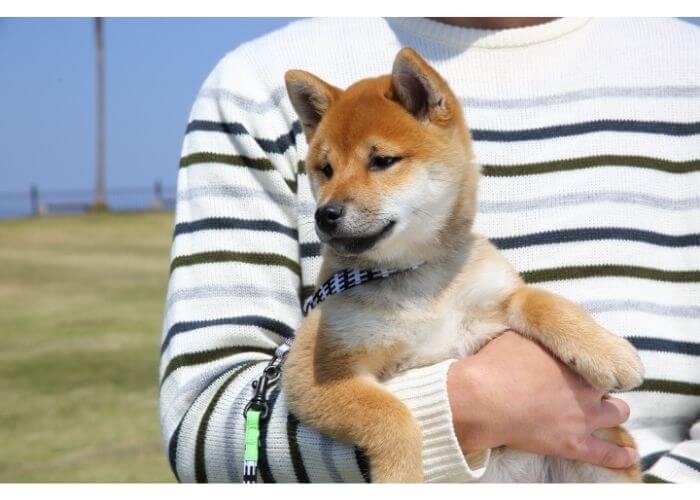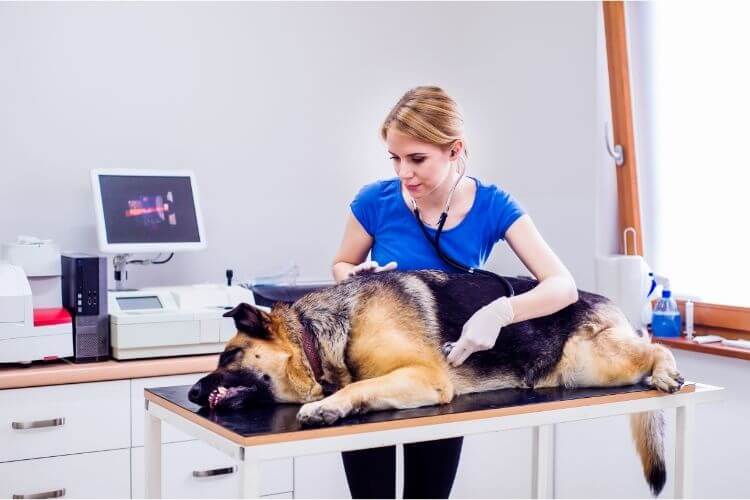Is your German shepherd pup chewing almost everything he comes across? Are his gums bleeding, inflamed, or swollen? Maybe you noticed some blood stains on your pup’s toys, and you’re so worried.
No need to; your pup is in the teething stage.
In this article, I’ll tell you when German shepherds start and stop teething, the symptoms to expect, and what to do to ease the pain and discomfort that they could be having.
When do German shepherds stop teething, therefore?
German shepherd starts teething at about 6 weeks. At this time, German shepherds have numerous teething problems. Giving a teething German shepherd chew toys, frozen dishcloth or fruit, chamomile tea, and pup teething gel eases these issues. At 6 weeks, German shepherds stop teething since adult teeth will have grown and the puppy teeth have fallen out.
Do German Shepherds Have Teeth Problems?
Yes, like other dogs, German shepherds have teeth problems. It’s not likely that your German shepherd will manifest all the teething problems. But there will be enough problems to show that he is teething.
Also, how they respond to these problems depends on an individual dog. So, which are these problems I’m talking about?
Bleeding Gums
When the GS are teething, their gums swell. Consequently, when they chew, they bleed. Since the bleeding isn’t much, you won’t see blood oozing out.
However, as a keen pet owner, you will notice traces of blood on any material they just chewed, for instance, toys.
Don’t fret. It’s an indication that your pet is teething. In rare cases, though, the pup might bleed a lot more when they chew a lot. Such cases need special attention. Call your vet ASAP.
Abnormal Chewing Habits
During the teething phase, puppies experience gum pain. Thus, their desire to get relief makes them chew pretty anything they find. Be careful, therefore, because if you misplace some valuables, they are likely to damage them.
To stay safe, buy pets and anything else that can help keep your buddy busy chewing. Preventivevet.com says, “Dogs have an innate desire and need to chew. Unfortunately, they’re not always great at picking the best things to chew on.” You, therefore, have a role to play; not everything is safe for your dog.
Missing Teeth
For the adult teeth to grow, the milk teeth fall off. As such, you are likely to see a missing tooth.
You might even notice a tooth in its resting place or playing areas.
Distress
Like we have mentioned previously, teething causes pain. The pain causes distress in your dog. He, therefore, refuses to play or eat. Actually, at this time, it’s advisable not to give him hard food. His baby teeth aren’t yet strong enough.
Also, since he is chewing almost everything, he might experience diarrhea. Call your vet in such situations.
Drooling
Though not in all cases, drooling can be due to teething. Drooling can happen naturally. In some cases, though, it can be a point of concern.
Salivary gland problem(s) can be one of the unusual causes of drooling. It is easy to know if a case is uncommon. For example, if drooling lasts for too long, or if the pet is not at the teething stage, then that’s an unusual case.
Nonetheless, please note that drooling, too, occurs during teething. It’s best to seek your vet’s recommendation(s).
Mild Fever
A mild fever is one of the least common signs you will see in pets. Your pet could be one of the few that suffers from fever.
If you notice it, don’t fret. It should end naturally within seven days. If it persists, then seek a vet’s attention.
Now that you know the teething problems you are likely to deal with, for how long will this last?
What Age Will My German Shepherd Stop Teething?
Usually, teething in puppies lasts between 4 to 5 months. For German shepherd dogs, however, it can be around 4 to 6 months.
Before they are three months old, the incisors and canines are already growing. On the other hand, the molars, carnassial, and premolars grow between 3 to 6 months.
It is necessary to take your pup to the vet to ascertain if all the teeth are growing accordingly. If there be any issues, he can correct them or advise accordingly.
German shepherd Teething Age and Stages
There are several teething stages your pup will go through.
Each stage has different signs and symptoms. As such, it’s necessary to get acquainted with each stage. Thus, deal with each appropriately.
Early Teething Stage
The early-stage refers to days and weeks after the pet has been born. Puppies mainly depend on breastfeeding during this time as they cannot chew.
At this stage, they have no teeth (in exceptional cases, though, they are born with teeth).
It won’t be long before you start seeing the deciduous teeth. They are about 28 teeth.
The deciduous teeth grow at the age of 3 to 8 months (14 to 30 weeks).
First Teeth
Incisors are the first teeth to grow. Typically, there are 6 at the top and at the bottom. Usually, they are very sharp; hence some people call them needle teeth.
Two canines, both at the top and at the bottom, follow. Eventually, premolars start to grow behind the canines at the age of 3 to 6 weeks. There are 3 premolars on both sides; top and bottom.
Adult Teeth
Milk teeth, also known as deciduous teeth, start falling off to pave the way for adult (permanent) teeth. In the order they grew, the same order they fall in—first, the incisors, then the canines, and lastly, the premolars.
Incisors fall at 12 to 16 weeks. The canines, on the other hand, fall at 16 weeks and the premolars at approximately 24 weeks.
At 32 weeks, your pup should have 12 incisors, 16 premolars, 4 canines, and 10 molars. That adds up to 42 adult teeth.
He is all grown now and can chew anything hard with much ease.
What Can You Give a Teething German Shepherd?
It’s never easy for a German shepherd pup during the teething phase. It’s, therefore, necessary to do your best to ease the situation for him.
How?
By giving him any of the following:
Soft Chew Toys
During the teething phase, your buddy wants to chew anything he comes around, including your coach and furniture. To successfully prevent this, buy him chew toys.
Don’t buy toys that are too hard. The soft ones are the best. Therefore, consider buying those made of plastic as they’re soft yet durable. A good example is 14 Pack Puppy Chew Toys Dog because it is made of rubber; hence won’t break his growing teeth.
Do also ensure to consider the safety of your German shepherd puppy when buying the toys.
Ensure they’re safe for him to chew. A high-quality chew toy would also be ideal as it saves you the trouble of buying others soon after that.
Give Them a Frozen Dish Cloth and Fruits
Wash your dishcloth and rinse. Next, freeze it.
A frozen dishcloth is extremely hard to chew. However, your German shepherd puppy will still try to chew. In his efforts, the teeth get numb. Consequently, he gets relief.
Fruits are edible, so they’ll definitely eat and swallow them as their teeth get numbed to relief pain. Be sure, though, not to over-feed them with these fruits. It’s not healthy for him.
Nonetheless, only freeze fruits that are safe for him after being frozen. Such may include blueberries, apples, strawberries, and pears.
Chamomile Tea
Teething makes it difficult for your teething German shepherd puppy to sleep. Thanks to cooled chamomile tea, it enables your pup to sleep.
Besides, it’s also a pain reliever.
Pup Teething Gel
The best teething German shepherd gel should contain natural ingredients. These prevent health issues that may occur if your dog swallowed it.
Mark & Chappell Teething Gel is a good example of a safe puppy teething gel as it contains natural ingredients. It’s necessary to contact your vet on how to use it. Do also read the given instructions on the product’s label.
How To Control What Your Teething German Shepherd Pup Chews
German shepherd pups chew anything without caring about its value. They’re just learning how to chew, and they will try it on anything they come across.
You need to take control and set boundaries for him.
How do you do this?
Buy Taste Deterrent
Taste deterrent has a sour taste that your German shepherd pup will not want to get close to ever again. Thankfully, they’re safe; hence won’t cause any health complications. A good example is the NaturVet – Bitter Yuck deterrent.
So, spray any taste deterrent on the areas your pup has been chewing contrary to your wish or commands.
Even so, if you’re spraying the deterrent on bright products such as white sofas, try out with a small amount to confirm if it’s going to leave stains.
Use Commands
Learn to use commands whenever you see your teething German shepherd biting your valuables. Use an authoritative voice so that he understands he is biting the forbidden things.
Remember, he is in the learning phase. So, don’t stop at it; give him a substitute so that he knows what to chew moving forward.
Verdict: This Too Will Pass!
It’s not easy for your teething German shepherd pup during this phase; neither is for you. There’s too much he is learning at this time, for example, what to chew and what not to.
It can be discouraging to find that he has chewed your most valuable asset.
Bear with him as you try to chew-proof your home. Remember, this, too, will pass away.
Let me hear from you; how is your teething German shepherd responding to the teething problem? Have you tried any of the recommended products to suppress the teething problem(s)?
Please share your experience with us in the comment section.


